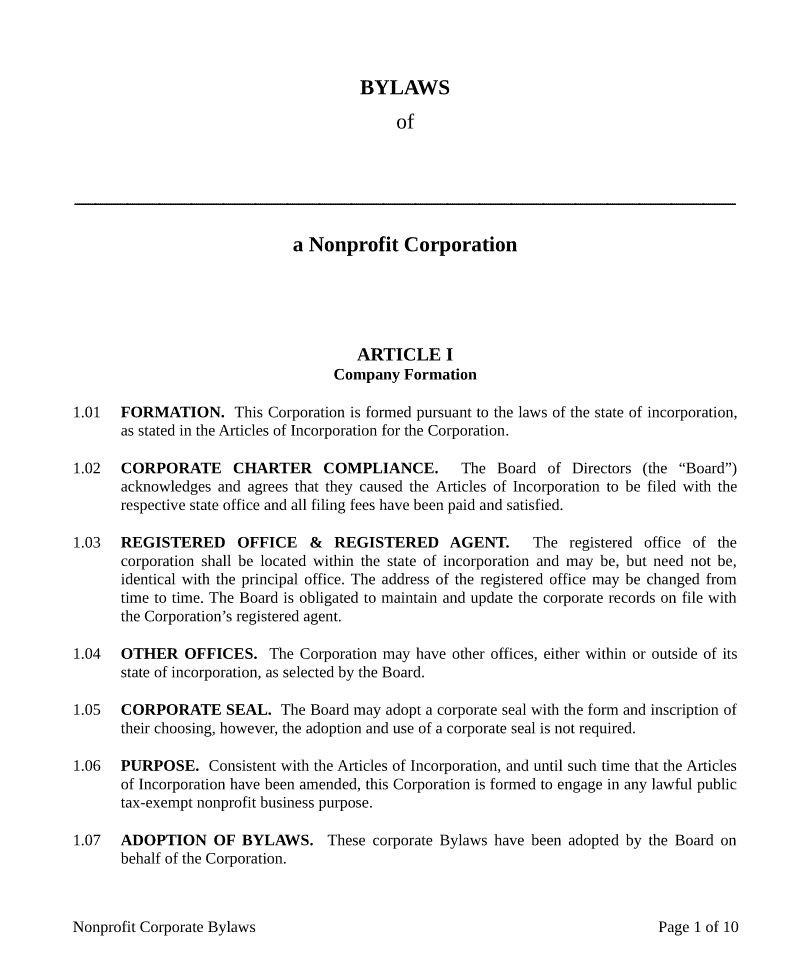Pennsylvania Nonprofit Bylaws
Your Pennsylvania nonprofit bylaws define your organization’s governing rules and regulations. Bylaws establish firm guidelines for activities like managing members, meeting a quorum, and handling conflicts of interest. Your bylaws also outline the roles and responsibilities of members, which helps protect your members’ rights and your nonprofit’s organizational integrity. Adopting bylaws is an integral part of your nonprofit’s formation process.
Get started on your bylaws today with our attorney-drafted nonprofit bylaws template.
Why does a Pennsylvania nonprofit need bylaws?
Even though you don’t need to submit your bylaws to the Pennsylvania Department of State like your Pennsylvania Articles of Incorporation, you should craft your nonprofit bylaws carefully and thoughtfully. Your bylaws are the central governing document for your organization and will most likely become public record. Find out why your nonprofit needs strong bylaws.
1. Nonprofit bylaws are highly encouraged in Pennsylvania.
Pennsylvania state law doesn’t require your nonprofit to adopt bylaws, but it does imply that adopting bylaws is standard practice for nonprofit corporations. For example, 15 PACS § 5310 calls for your initial directors or incorporators to hold an organizational meeting as soon as your nonprofit has an official “corporate existence, and the law lists the primary purpose of this meeting as “adopting bylaws.” The Pennsylvania Consolidated Statutes on nonprofit corporations also frequently refer to bylaws as if under the assumption that all nonprofit corporations will adopt bylaws. Lastly, it’s important to note that if you plan to apply for federal tax-exempt status, you will be required to have bylaws and send a copy to the IRS.
2. Third parties will ask to see your bylaws.
Believe it or not, it’s typical for third parties to ask to see your bylaws. The most well-known third party is the IRS, which will review your bylaws before granting you tax-exempt status. However, you can expect banks, investors, and partnering organizations to ask to view your bylaws so that they can assess the legitimacy of your nonprofit before making financial or other business arrangements with you.
3. Nonprofit bylaws allow you more control over your nonprofit.
Without bylaws in place, your nonprofit’s internal operations are subject to the rules contained in the Pennsylvania Consolidated Statutes. While some of these rules apply to all nonprofit corporations, others apply only in cases where a nonprofit fails to provide its own rules in its bylaws. For example, your nonprofit may wish to set forth specific voting procedures that differ from the default procedures listed in the Pennsylvania Consolidated Statutes. To do this, you would need to include a provision on voting procedures in your bylaws.
Another way bylaws help you maintain control over your nonprofit is by preventing disputes between members over procedure. This is crucial because a dispute could lead to legal action against your nonprofit, such as a state investigation or a suit, which could negatively impact your nonprofit. Protect your nonprofit and its resources with thorough bylaws.
Want to learn more? Check out our Guide to Nonprofits.
What do Pennsylvania Nonprofit Bylaws include?
Your Pennsylvania nonprofit bylaws should include essential information about your nonprofit, such as its name, address, and purpose. Your bylaws should also contain all of the specific regulations required for governing your nonprofit, such as:
- adding or removing board members
- giving notice and holding board meetings
- taking a vote and meeting quorum requirements
- handling conflicts of interest
- compensating directors
- keeping records
- amending the bylaws
- operating during emergencies
- dissolving the nonprofit
Your bylaws can contain any provisions that relate to the affairs of your nonprofit so long as those provisions aren’t at odds with the law or your articles of incorporation.
Are nonprofit bylaws legally binding?
Yes. Your Pennsylvania nonprofit bylaws function as a legally binding contract for the members of your organization (directors, officers, and employees) and can be used to hold members liable for bylaws violations in a court of law. 15 PaCS § 5505 notes that the rules in your bylaw don’t apply to “contract or dealings with other persons, unless those persons have actual knowledge of the bylaws.” In which case, it is possible for individuals outside of your nonprofit to be held accountable for breaching your bylaws if they knowingly act against your bylaws while working with your organization.
Are nonprofit bylaws public record?
It depends. Since you don’t have to file your nonprofit bylaws with the state, it’s technically possible for your nonprofit to keep your bylaws private. With that said, if you seek 501(c)(3) tax-exempt status with IRS, your bylaws will become public. This is because you are required to attach a copy of your bylaws to your 501(c)(3) application, and the IRS makes all applications public. Additionally, it’s common for nonprofits to publish their own bylaws to demonstrate transparency and build trust with donors.
FAQs
No. Your nonprofit bylaws don’t need to be signed by your board of directors. However, having your board’s signatures makes your bylaws appear more official to third parties. Your board’s signatures also send a message that your directors are on the same page regarding how to run your nonprofit.
Yes. The power to change your bylaws is vested in the members of your nonprofit who have voting rights unless your bylaws state otherwise (15 PaCS § 5504). One exception is during your nonprofit’s organizational meeting when the initial board or incorporators also have the ability to amend your bylaws (15 PACS § 5310). It’s customary for your bylaws to include rules for making amendments to prevent disagreements between members over procedure and ensure that the process runs smoothly.
Your incorporators or initial board of directors should adopt your bylaws at your nonprofit’s first organizational meeting (15 PACS § 5310).
